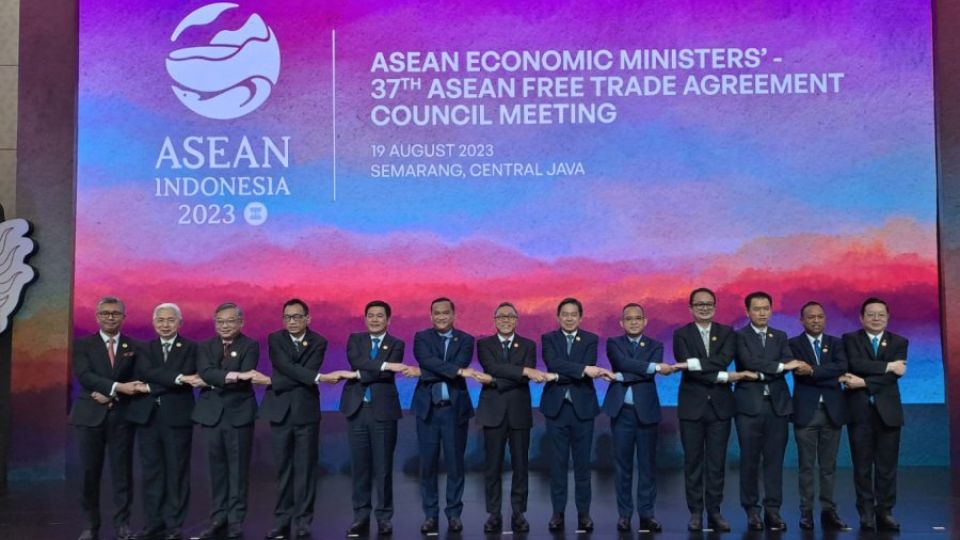August 24, 2023
JAKARTA – Under Indonesia’s leadership, ASEAN has used a trade and investment summit to promote itself as a fast-developing region that is willing to take a pragmatic position in a world deeply divided along geopolitical fault lines.
Deputy ASEAN secretary-general Satvinder Singh said on Tuesday that ASEAN had always had very strong relationships with all the large powers of the world, despite current tensions.
“Our universe today is still a complete universe where we work with everyone,” Singh told reporters at the 55th ASEAN Economic Ministers’ (AEM) Meeting in Semarang, Central Java.
Singh asserted that the region had been nourishing strong, decades-long, reciprocal relationships with the United States, the European Union, China and Russia in both trade and investment, regardless of the geopolitical situation.
Neutrality, Singh said, was a position adopted universally by ASEAN member states in consideration of the long-term goal of “staying relevant to the world”.
“For the benefit of our people, we need to be connected to all markets, all communities,” Singh said after the final press conference of the six-day event.
Deputy Trade Minister Jerry Sambuaga said Jakarta endorsed the same view, given the country’s principle of pursuing a free and active foreign policy.
“So long as it brings benefits to national interests, […] I think there’s no problem, as long as it remains within our foreign policy corridors,” Jerry told reporters on the sidelines of the same event, on Friday.
He explained that Indonesia adopted the same stance across its bilateral and multilateral relations. The latter manifested, for instance, in ASEAN, the Asia Pacific Economic Cooperation (APEC) and in the Group of 20.
In all three, Indonesia was pushing for cooperation and collaboration that was both fair and would satisfy national interests, Jerry reiterated.
“Just because [China and the US] are in strife, did we close our doors to China? No. Did we [close them] to the US? No,” said Jerry, adding: “Because they’re in conflict, both will turn to us. Who’s reaping the benefits? Indonesia.”
As a case in point, Jerry pointed to Indonesia’s surplus in bilateral trade with the US.
Indonesia exported US$39.6 billion worth of goods to the US from January 2022 to June 2023, far exceeding imports of $16.6 billion during the same period.
Jerry credited this to Indonesian assets of natural resources and human capital that gave the country “a clear bargaining position”, which did not only apply to the US but also to fellow ASEAN and Asia Pacific countries, “as well as probably East Asian countries”.
Reiterating this view, ASEAN Business Advisory Council (ASEAN-BAC) chairman Arsjad Rasjid said on Friday that ASEAN enterprises were open to conducting business indiscriminately.
“From the ASEAN business side, we always want to conduct business with anyone, from any country, whether it’s Russia, India or any other country,” Arsjad, who is also the chairman of the Indonesian Chamber of Commerce and Industry (Kadin), told reporters a day prior to having a meeting with the AEM in Semarang.
US Trade Representative Katherine Tai declined to comment specifically on the stance of ASEAN authorities and businesses. The ambassador pointed out instead that the global economy was going through changes such as a climate crisis and a digital transformation, necessitating more resilient and secure supply chains, as well as noting the increasing geopolitical tensions.
“These are all the things we need to pay attention to in order to have a world economy that works better for our people,” Tai told The Jakarta Post at the venue of the AEM Meeting on Monday.
Inclusivity is one of the values emphasized by ASEAN at this year’s summit, be it in the context of trade, investment or business collaboration, which materialized through the summit inviting and holding discussions with clashing sovereignties like the US, Russia, China and India.
The AEM Meeting afforded each of the four countries their respective two-way consultancy sessions, with a consensus reached in all four meetings. Representatives of the four parties sat together in the East Asia Summit (EAS) Economic Ministers Meeting on Monday.
Unsurprisingly, that forum was divided and achieved no consensus, mainly due to Washington and Tokyo opposing Moscow, according to Indonesian Trade Minister Zulkifli Hasan.


